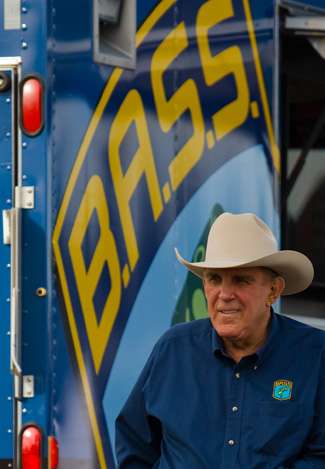
Photos | Standings | Live coverage | Archive
DECATUR, Ala. — It doesn’t seem so long ago that B.A.S.S. founder Ray Scott was introducing the second generation of professional bass fishermen at tournaments around the country. Youngsters such as Kevin VanDam, Tommy Biffle, Gary Klein and Shaw Grigsby had joined the ranks of pioneers such as Larry Nixon, Ken Cook, Denny Brauer, Guy Eaker and Paul Elias. Even the latter were latecomers compared to the likes of Roland Martin, Bill Dance, Rick Clunn and Jimmy Houston.Now, with the third and even fourth generations making names for themselves, a visit to the Evan Williams Dixie Duel on Lake Wheeler by Mr. Bass prompted him to wax nostalgic with some of the older pros and compare and contrast them with the young guns of today.The biggest difference between the formative years and now is how well-educated today’s pros are compared to the first batch that showed up in those early tournaments,” said Scott, who drew a rousing cheer from several hundred spectators when he walked onto the Ingalls Harbor weigh-in stage. “In that first tournament at Beaver Lake, Ark., in June 1967, most of the contestants were guys who were good on their home waters and that was about it. They didn’t even know what a trolling motor was. A big learning curve started there, and it grew and was built upon by the B.A.S.S. tournament fishermen who came later. Bassmaster Magazine became the big funnel that everybody poured fishing knowledge into, and what came out the other end was instrumental in making the pros of today.”
Guy Eaker, at 70 the oldest qualifier in the Elite Series, noted that when he started in the sport 33 years ago, bass fishing was essentially a blank slate that filled up slowly at first as new techniques, lures and technological innovations arrived on the scene.”Who would have ever thought that one day you could drop a lure down in the water, see it on a screen and watch a bass come up and nail it?” said Eaker. “The technology of today is just incredible. You had to have professionals back then who had ideas about what they needed to accomplish their goals, and who teamed up with innovative manufacturers that supplied the electronics, boats, motors, tackle and everything else to move the sport forward.”Scott, Martin, John Powell and a few others started in the first bass-fishing seminars back in the late 60s, and now such events that feature today’s superstars are status quo across the land. Collegiate bass fishing has become entrenched, and some high schools in the Midwest are adding bass fishing to their curricula. Many of the pros in the Elite Series have benefitted from such emphasis, which is reflected by the fact that 51 of them have less than 10 years’ experience each as a pro.
“With the schooling these young guys get early — from seminars, ESPN, Bassmaster and the like when they’re just kids, it’s no wonder they’re so good,” added Eaker. “Now there’s the Marshal Program in the Elite Series that gives anyone the chance to go out with a top pro each of three days and learn from the best. I’ll admit it: even a lot of the guys who just fish local tournaments now are as good or better than a lot of the pros of the early days. But you’ve got to respect those old pros; they set the table.”Rick Clunn, a touring pro for 34 years, noted that another definitive difference between the pros of the 70s and now is that many of the modern-day masters had only short careers in other professions, if any.A lot of the younger pros are just phenomenal when they come out of the gate and they reach the upper ranks in practically no time,” said Clunn. “It wasn’t like that when I started out. There were fishermen from all walks of life. They were trying to earn a living from fishing because they loved it. Some learned, some got better, and some just didn’t make it. But they all added something to make the sport what it is today.”One thing that bothers me nowadays is how many young pros almost take what they have for granted. They grumble about sponsors or rules or whatever as if something is owed to them. I don’t have a lot of patience with the whining group. The freedom to do what we do is priceless.”
